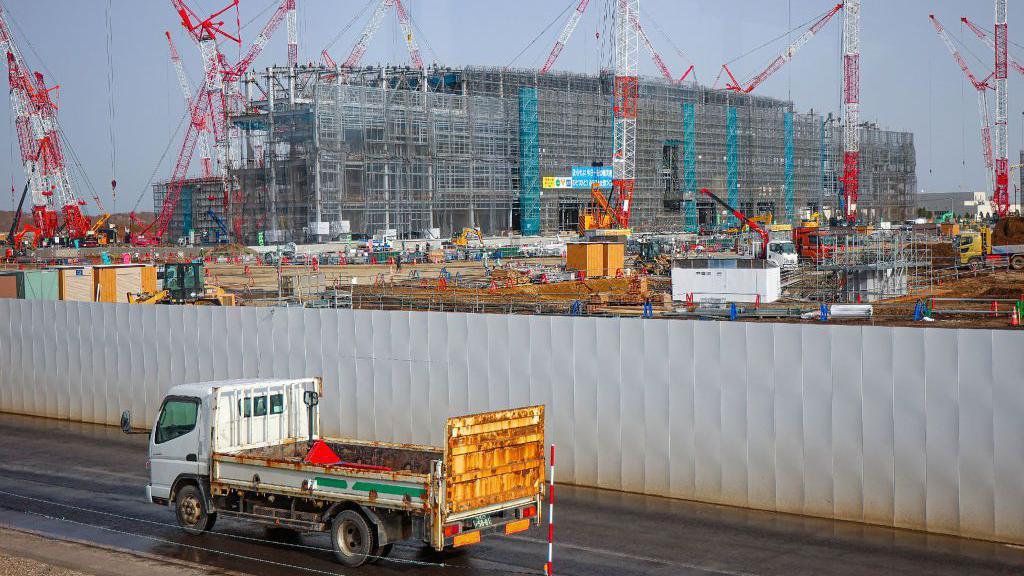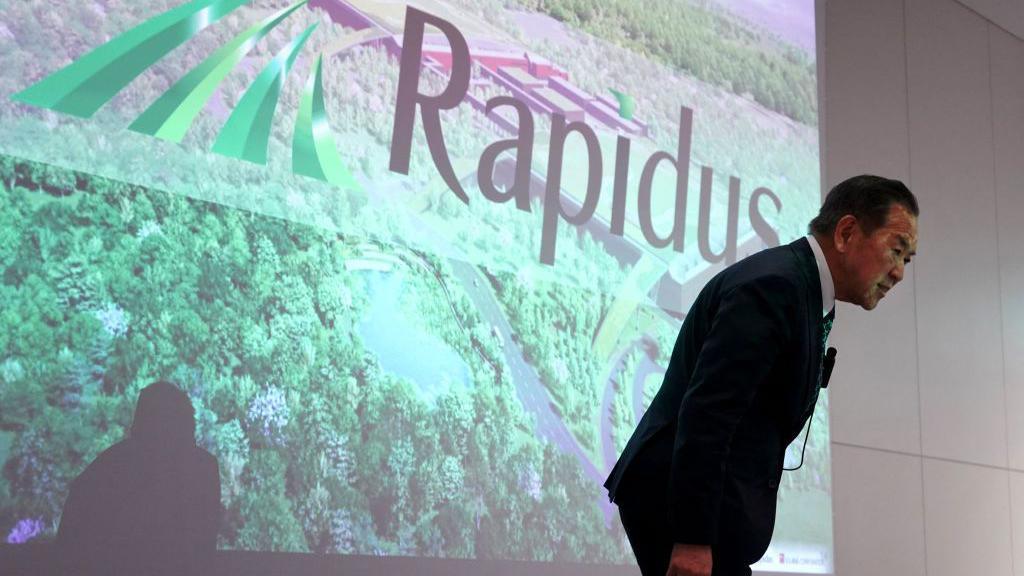Japan's high-stakes gamble to turn island of flowers into global chip hub

Hokkaido is a tourism and agricultural region, but Rapidus is making chips there too
- Published
The island of Hokkaido has long been an agricultural powerhouse – now Japan is investing billions to turn it into a global hub for advanced semiconductors.
More than half of Japan's dairy produce comes from Hokkaido, the northernmost of its main islands. In winter, it's a wonderland of ski resorts and ice-sculpture festivals; in summer, fields bloom with bands of lavender, poppies and sunflowers.
These days, cranes are popping up across the island – building factories, research centres and universities focused on technology. It's part of Japan's boldest industrial push in a generation: an attempt to reboot the country's chip-making capabilities and reshape its economic future.
Locals say that beyond the cattle and tourism, Hokkaido has long lacked other industries. There's even a saying that those who go there do so only to leave.
But if the government succeeds in turning Hokkaido into Japan's answer to Silicon Valley - or "Hokkaido Valley", as some have begun to call it - the country could become a new contender in the $600bn (£458bn) race to supply the world's computer chips.
An unlikely player
At the heart of the plan is Rapidus, a little-known company backed by the government and some of Japan's biggest corporations including Toyota, Softbank and Sony.
Born out of a partnership with IBM, it has raised billions of dollars to build Japan's first cutting-edge chip foundry in decades.
The government has invested $12bn in the company, so that it can build a massive semiconductor factory or "fab" in the small city of Chitose.
In selecting the Hokkaido location, Rapidus CEO Atsuyoshi Koike points to Chitose's water, electricity infrastructure and its natural beauty.
Mr Koike oversaw the fab design, which will be completely covered in grass to harmonise with Hokkaido's landscape, he told the BBC.
Local authorities have also flagged the region as being at lower risk of earthquakes compared to other potential sites in Japan.
A key milestone for Rapidus came with the delivery of an extreme ultraviolet lithography (EUV) system from the Dutch company ASML.
The high-tech machinery helped bring about Rapidus' biggest accomplishment yet earlier this year – the successful production of prototype two nanometre (2nm) transistors.
These ultra-thin chips are at the cutting edge of semiconductor technology and allow devices to run faster and more efficiently.
It's a feat only rival chip makers TSMC and Samsung have accomplished. Intel is not pursuing 2nm, it is leapfrogging from 7nm straight to 1.8nm.
"We succeeded in manufacturing the 2nm prototype for the first time in Japan, and at an unprecedented speed in Japan and globally," Mr Koike said.
He credits the IBM partnership for helping achieve the breakthrough.
Tie-ups with global companies are essential to acquiring the technology needed for this level of chips, he added.
The sceptics
Rapidus is confident that it is on track to mass produce 2nm chips by 2027. The challenge will be achieving the yield and quality that is needed to survive in an incredibly competitive market – the very areas where Taiwan and South Korea have pulled ahead.
TSMC for example has achieved incredible success in mass production, but making high-end chips is costly and technically demanding.
In a 2024 report, the Asean+3 Macroeconomic Research Office highlighted that although Rapidus is receiving government subsidies and consortium members are contributing funds: "The financing falls short of the expected 5 trillion yen ($31.8bn; £24.4bn) needed to start mass production."
The Center for Security and International Studies (CSIS) has previously said: "Rapidus has no experience in manufacturing advanced chips, and to date there is no indication that it will be able to access actual know-how for such an endeavour from companies with the requisite experience (ie TSMC and Samsung)."
Finding customers may also be a challenge – Samsung and TSMC have established relationships with global companies that have been buying their chips for years.
The lost decades
Nevertheless, Japan's government is pouring money into the chip industry - $27bn between 2020 and early 2024 - a larger commitment relative to its gross domestic product (GDP) than the US made through the Biden-era CHIPS Act.
In late 2024, Tokyo unveiled a $65bn package for Artificial Intelligence (AI) and semiconductors that could further support Rapidus's expansion plans.
This comes after decades of decline. Forty years ago Japan made more than half of the world's semiconductors. Today, it produces just over 10%.
Many point to US-Japan trade tensions in the 1980s as a turning point.
Naoyuki Yoshino, professor emeritus at Keio University, said Japan lost out in the technology stakes to Taiwan and South Korea in the 1980s, leaving domestic companies weaker.
Unlike its rivals, Japan failed to sustain subsidies to keep its chipmakers competitive.
But Mr Koike says that mentality has changed.
"The [national] government and local government are united in supporting our industry to revive once again."

Rapidus has already achieved a production prototype of a 2nm chip
Japan's broader economic challenges also loom large. Its population is shrinking while the number of elderly citizens continues to surge. That has determined the national budget for years and has contributed to slowing growth.
More than a third of its budget now goes to social welfare for the elderly, and that squeezes the money available for research, education and technology, Prof Yoshino says.
Japan also faces a severe shortage of semiconductor engineers – an estimated 40,000 people in the coming years.
Rapidus is partnering with Hokkaido University and others to train new workers, but agrees it will have to rely heavily on foreigners, at a time when public support for workers coming into the country for employment is low.
Growing an ecosystem
The government's push is already attracting major global players.
TSMC is producing 12–28nm chips in Kumamoto, on the south-western island of Kyushu - a significant step for Japan, even if it lags behind the company's cutting-edge production in Taiwan.
The expansion has transformed the local economy, attracting suppliers, raising wages, and leading to infrastructure and service developments.
Japan's broader chip revival strategy appears to be following a playbook: establish a "fab", and an entire ecosystem will tend to follow.
TSMC started building a second plant on Kyushu in October this year, which is due to begin production by the end of 2027.
Beyond Rapidus and TSMC, local players like Kioxia and Toshiba are also getting government backing.
Kioxia has expanded fabs in Yokkaichi and Kitakami with state funds and Toshiba has built one in Ishikawa. Meanwhile, ROHM has been officially designated as a company that provides critical products under Tokyo's economic security framework.
American memory chipmaker Micron will also receive $3.63bn in subsidies from the Japanese government to grow facilities in Hiroshima, while Samsung is building a research and development facility in Yokohama.
Hokkaido is seeing similar momentum. Chipmaking equipment companies ASML and Tokyo Electron have both opened offices in Chitose, off the back of Rapidus building a production facility there.
"This will make a form of 'global ecosystem'," Mr Koike says, "where we work together to be able to produce semiconductors that contribute to the world."

The CEO of Rapidus says the firm's edge is bespoke chips that can be delivered quickly
Mr Koike said Rapidus's key selling point would be - as its name suggests - an ability to produce custom chips faster than competitors, rather than competing directly with other players.
"TSMC leads the world, with Intel and Samsung close behind. Our edge is speed - we can produce and deliver chips three to four times faster than anyone else. That speed is what gives us an edge in the global semiconductor race," Mr Koike said.
Big bet
Global demand for chips is surging with the rise of AI, while Japan's automakers - still recovering from pandemic-era supply shocks - are pressing for more reliable, domestically or regionally sourced production across the entire supply chain, from raw materials to finished chips.
Securing control over chip manufacturing is being seen as a national security priority, both in Japan and elsewhere, as recent trade frictions and geopolitical tensions between China and Taiwan raise concerns around the risks of relying on foreign suppliers.
"We'd like to provide products from Japan once again – products that are powerful and with great new value," Mr Koike said.
For Japan's government, investing in Rapidus is a high-stakes gamble to revive its semiconductor industry and more broadly its tech power.
And some analysts say it may be the country's best chance to build a domestic ecosystem to supply advanced chips to its many manufacturers, and one day become a formidable challenger in the global market.
Additional reporting by Jaltson Akkanath Chummar